17 January 2018
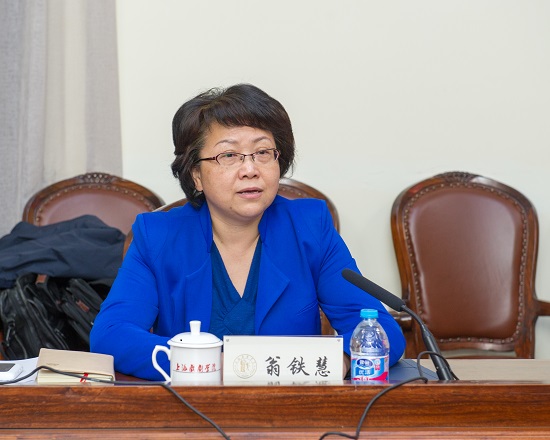
(Ms Weng Tiehui, Vice Mayor of Shanghai, giving a speech)
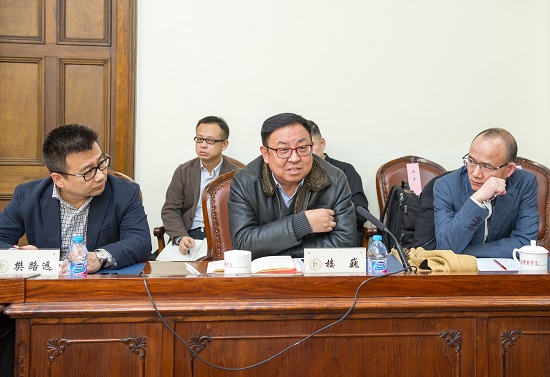
(Mr Lou Wei, Chairman of STA, giving a work report on behald of STA)
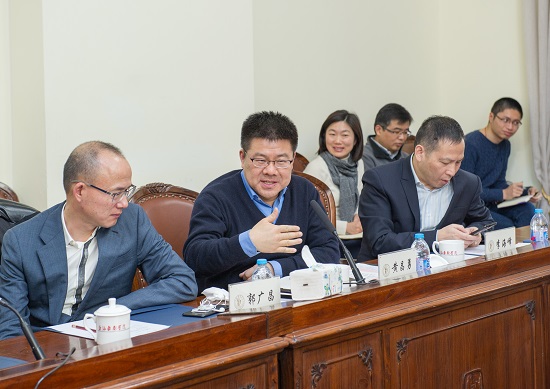
(Professor Huang Changyong, President of STA, giving a work report on behalf of STA)
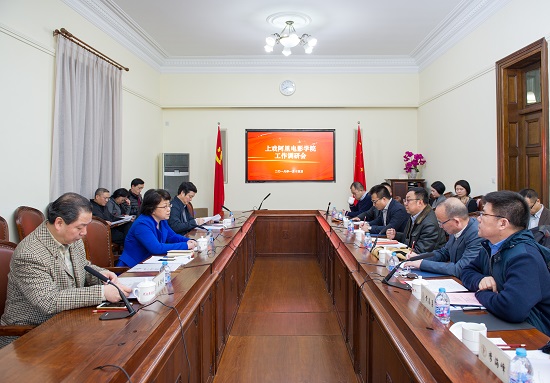
(Meeting in progress)
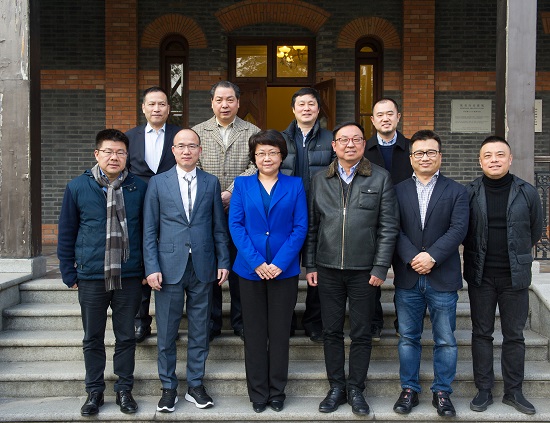
(Group photo of meeting participants)
On the afternoon of 15 January, Ms Weng Tiehui, Vice Mayor of Shanghai, visited the Shanghai Theatre Academy (STA) for an update on the preparatory work of the STA-Ali Film School, accompanied by Mr Ding Xiaodong, Deputy Director-General of the Shanghai Municipal Education Commission, Mr Wu Xiaoming, Artistic Director of the Shanghai Municipal Administration of Culture, Radio, Film and Television, and leaders of the relevant functional departments and divisions of the Shanghai Municipal Education Commission. Mr Lou Wei, Chairman of STA, Mr Zhang Weiling, Vice President of STA, Mr Guo Guangchang, Chairman of the Fosun Group, Mr Li Haifeng, President of the Fosun Film and Television Group, Mr Fan Luyuan, Partner of Alibaba and Vice President of Ali Pictures Group, participated in the meeting. The meeting was chaired by Professor Wang Changyong, Vice Chairman and President of STA.
Professor Huang Changyong, President of STA, gave a report on behalf of STA, advising that the preparatory work of the STA-Ali Film School is progressing in an orderly manner in all aspects under the joint efforts of the three partnering parties. He provided a detailed introduction about the establishment scheme of the STA-Ali Film School, including the positioning of the school, scale of the school, innovation in systems and mechanisms, as well as the progress of the registration application of the STA-Ali Film and Television Education Development Foundation and the STA-Ali Film and Television Education Promotion Centre as two separate private non-enterprise entities. Mr Lou Wei, Chairman of STA, gave further explanation about the positioning and goals of the STA-Ali Film School and highlighted that the three parties will make full use of their strengths and characteristics in the industry and strive to build a future-oriented, high-level and internationalized film school. Mr Guo Guangchang, Chairman of Fosun Group, and Mr Fan Luyuan, Chairman of Ali Pictures Group, both expressed that this cooperation has received the strong support of the Shanghai Municipal Government and that Fosun and Ali as two companies with ideals and inspirations and a high sense of social responsibility will take the establishment of the STA-Ali Film School as an opportunity, take serving Shanghai as their own responsibility and make their due contribution to Shanghai’s efforts in "building a global city of excellence and an international cultural metropolis".
Mr Ding Xiaodong, Deputy Director-General of the Shanghai Municipal Education Committee, affirmed the feasibility and innovation of the establishment scheme of the STA-Ali Film School. He pointed out that the proposal design of the STA-Ali Film School is a bold innovation and rewarding exploration of the running model of higher education institutions, and hoped that the three partnering parties will intensify the reform and establish and improve the relevant systems in the five aspects of "leadership rights, personnel rights, administrative rights, financial rights and property rights" and come up with the experience and models can be applied broadly. Mr Wu Xiaoming, Artistic Director of the Shanghai Municipal Administration of Culture, Radio, Film and Television, said that the preparation for the establishment of the STA-Ali Film School fits well with Shanghai's newly issued "50-article guidelines of for cultural and creative industries" as well as Shanghai's positioning to build itself into a global centre for film creation and production, and that the new school may rely on the Shanghai International Film Festival and other international platforms in Shanghai to develop and grow rapidly.
Ms Weng Tiehui, Vice Mayor of Shanghai, fully affirmed the establishment scheme and positioning of goals and objectives of the STA-Ali Film School. She pointed out that the first article of Shanghai’s newly issued "50-article guidelines for cultural and creative industries" is to build a global centre for film and television creation and production and create the "1+3+N" pattern. Film and television will be a focus of the future development of Shanghai’s cultural and creative industries and will serve as the best carrier of showing cultural confidence and telling Chinese stories. In this background, it is very timely and very necessary that the three parties of STA, Ali and Fosun will jointly establish a film school that benchmarks the international standards, which is of important significance to Shanghai’s construction and development. Vice Mayor Weng emphasized that the three parties should learn from the advanced experience of international first-class art universities and make good top-level design and system building for the STA-Ali Film School. She fully affirmed the idea to cover the entire industrial chain of film and television in terms of the positioning of talent cultivation under the current scheme as well as the bold reform and innovation in systems and mechanisms. She pointed out that STA should not stick to the traditional ideas of running a school and should give the STA-Ali Film School greater autonomy in its operation and give the enterprises greater room for participation so as to achieve a high degree of industry-university integration and should attached great importance to the research and development of high technologies in film and television and drive the industrial structure adjustment and economic development of the neighboring areas. She expressed that the CPC Shanghai Municipal Committee and the Shanghai Municipal Government will work with the relevant departments including the Minhang District where the school will be located to provide active support to the establishment of the STA-Ali Film School, thereby working together to create a first-class film school with modern concepts and a brand-new model through the joint efforts of government, university, enterprises and society.



